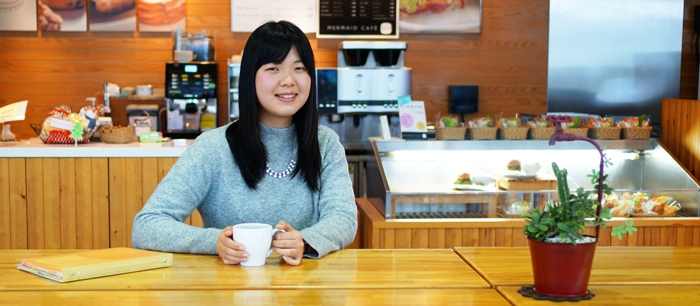
4th year, Cultural Heritage course, Faculty of Letters
Manami Abe
<Graduated from Okayama Prefectural Takahashi Senior High School>
Ms. Abe says, “Before entering university, I would have never thought I would take the Cultural Heritage course”. What can you learn in the Cultural Heritage course? What was it like when she was preparing for the university entrance examinations? We asked her those questions as well as about her campus life.
Why did you decide to apply for Hiroshima University?
My National Center Test score was definitely one of the deciding factors, but I also considered what I wanted to learn and what I can learn when I searched universities, and decided on Hiroshima University. I like humanities subjects, so I wanted to pursue humanities, but at that time I could not decide what exactly I wanted to learn. Hiroshima University’s Faculty of Letters not only has Literature, but other fields of study such as Language, Philosophy and Thoughts, History, Cultural Heritage studies and more. I felt I have a wide range of options to choose from, and this was the conclusive factor for me to choose this university. In the first year of Faculty of Letters, you take “introductory subjects”. Then, you choose your course/major field of study in the end of your first year. Some universities require you to choose your course before you enter the university, so that was also an appealing point for me.
Did you apply for private universities?
Yes, I also applied for private universities, but I had always hoped to enter a national university so I was happy to be accepted to Hiroshima University!
When did you start preparing for the university entrance examination?
After I retired from club activities, I started preparing around mid-August in my third year of High school. Prior to that, it wasn’t that I wasn’t studying at all. I was always taking my daily classes seriously and studying hard for regular tests. I did feel a bit anxious though, because I started my preparations a little late.
Did you go to a prep school or cramming school?
I was going to an English conversation school since I was young, but for other subjects I did not go to a prep school or cramming school. I studied at school or in the library. Before class and after school, I fervently solved work books handed out by the school. If I couldn’t understand something, I would immediately ask for help from my teacher. I summarized questions that I mistook easily and have trouble memorizing in my notebook so I could repeatedly look back on them. Mathematics was my weakest subject so I continuously asked questions to my teacher until I fully understood, and spared the most time on this subject. I tried to be careful not to leave problems I didn’t understand, unsolved. I would go to the faculty room especially during test week to get extra 1-to-1 help.
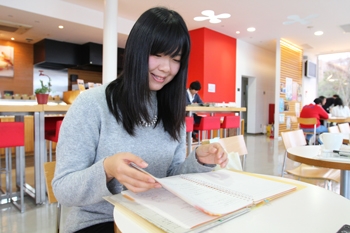
Ms. Abe looking at files she used when she was preparing for the university entrance exam
Did you experience any hard time when you were studying for the university entrance exam?
There was a time in February where I was so worried that I couldn’t settle down to study at all. That was a tough time for me.
How did you overcome that situation?
My friends and parents listened to my anxious feelings and supported me. Also, I decided to clearly separate the time to study and the time to rest. On a resting day, I would sleep and eat delicious food to cheer myself up (haha). I tried to thoroughly get enough rest.
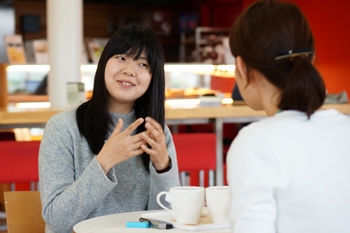
Ms. Abe reflecting back to the days when she was preparing for the entrance exams
And you were accepted in the first try! How was Hiroshima University after entering?
I am from Okayama prefecture so my home is rather close to Hiroshima, but I was full of anxiety in the beginning. It was also my first time living alone. However I made friends immediately during the freshman orientation camp and I still remember feeling reassured when my thoughtful seniors taught me how to register for classes.
Did you take classes from other faculties?
Yes. I wanted to take classes from other faculties even before I entered university. The Faculty of Letters allows students to take classes from other faculties. I decided to take classes from the Faculty of Education, Faculty of Law, and Faculty of Integrated Arts and Sciences.
You took so many classes! How about in the Cultural Heritage course? What do you study?
In the Cultural Heritage course, there are 3 main areas: Japan/Oriental Fine Arts, Historical Buildings, and Handicrafts. We sometimes visit an exhibition as part of class. We observe the display objects and learn about how to understand the different historical characteristics. There were many opportunities to see national treasures. I began to think more deeply about Japanese culture from learning about what has been passed down in Japan, Handicraft classes were really fun because there were workshops to make many kinds of Handicrafts.
Handicrafts from workshops
Did you have interest in Cultural Assets all along?
Before entering university, not really. I became interested after taking classes on Cultural Assets. My mentor, Professor Masayuki Miura always talks cheerfully about cultural assets such as castles. Listening to his lectures made me excited too. I decided to join Professor Miura’s seminar after being inspired from his classes.
How are your mentor’s guidance and the seminar’s atmosphere?
I am currently receiving guidance on my final graduation thesis. My mentor always kindly listens to what I have to say so I am making good progress. I receive instruction on my final graduation thesis 1-to-1 with my professor, but in the seminar room I also ask other members for advice on my research. For the Cultural Heritage course, there is a room where Graduate students and Undergraduate students can study together. It’s great that I can receive different opinions from different perspectives of various grade levels. The atmosphere is very friendly.
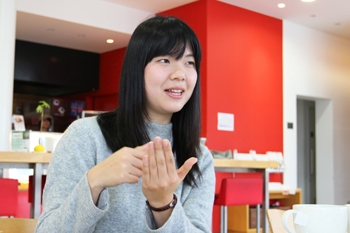
"The seminar's atmosphere is very friendly", says Ms. Abe
It seems like an ideal research environment! What is your final graduation thesis theme?
I am researching about historical buildings. I look into the exterior designs of the building and examine some regional characteristics. For example, looking at the different types of wooden lattice attached to the front of a Machiya (Japanese traditional townhouses), or trying to figure out what time period the lattice was first attached by looking at how the wood has worn down. I wanted to do something related to my hometown, so my research subjects are buildings in Fukiya district (Okayama prefecture, Takahashi city, Nariwa town) that is close to my hometown. Fukiya district is designated as an “Important Preservation District of Historic Buildings” in Japan. Through this research, I would like to study Fukiya district’s regional characteristics, significance as an “Important Preservation District”, and application for preservation and landscaping work. Cultural assets will not come to you no matter how long you wait. “Going to the research site” and “Seeing it with your own eyes” are indispensable to this field of study. It is important to me to use my own legs and eyes.
In Cultural Heritage studies, you choose your research subject from countless different cultural assets. Everyone is conducting different research. Research can vary from Shinto shrines, castles, theater, Kagura (sacred music and dance), Buddhist art, ceramics, and many more. It is very interesting because I can learn more about cultural assets outside of my research subject.
The look of houses in Fukiya district
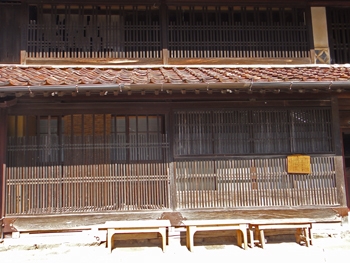
Lattice on a Machiya (Japanese Traditional townhouse)
Do you take part in any circle activities or part-time job?
I was part of the University Festival Planning Committee in my first and second year. Before entering the university, my image of a university festival was just “somewhere to go for fun”. I gained a valuable experience as the executor side by taking part in the planning and operation of the university festival. I was also able to make many friends outside of my own faculty.
From my third year, I have been helping out with support for students with disabilities as a student staff in the Accessibility center. Lately I have been participating about three times a week. For example, I attend a lecture with the student I am supporting, summarize the contents of the lecture, and enter it into a computer. The summarizing part requires speed so it was difficult in the beginning, but I feel my ability to “grasp the main points” has become better.
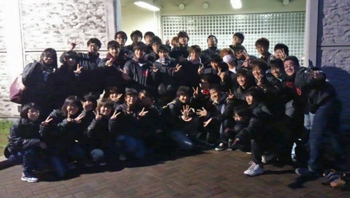
Group photograph of University Festival Planning Committee members
What are some points that you are glad that you entered Hiroshima University?
I was able to meet so many people! I met more people than I could have ever imagined when I was a high school student. Hiroshima University has multiple faculties in one campus, so you are able to take ”general education subjects” with students from other faculties in your first year. The great part about Hiroshima University is that you are able to meet students not only from different faculties, but students that grew up in different environment or students with a different object of interest. Many people around me are challenging themselves in various things such as study abroad, circle or volunteer activities.
I am always inspired by seeing students taking active steps or listening to stories I have never experienced. I was also able to meet someone that is my role model, who is my friend, She is always smiling, and always enjoying anything she challenges herself to do. Learning from her, I began to have a much more positive mindset. Hiroshima University has many students with unique and strong individualities. After meeting so many different values, I feel my horizons have broadened more than ever before. I know the encounters I made at Hiroshima University will be my provisions for the future.
Is there something you challenged yourself to do after being inspired?
I went to an isolated island "Tsushima" in Nagasaki prefecture for a week in the summer of my third year! I was never really the type to proactively do something, but I wanted to try something too because I was seeing my friends around me challenging different things.
Tsushima Island
What a bold challenge to go to an isolated island! What did you do there?
I participated in a field training of an island revitalization project in Tsushima city to learn about local development. We listened to lectures about local development and also participated in work that required a lot of physical strength such as cleaning old houses and cultivating wild land in districts with only elderly people and collecting garbage that washed ashore. There were about 30 participants (students and non students) from all around Japan. There was group work too; my group created a promotion video on Shitaru district. During the project, we were invited to stay with a local family, and the women’s association provided us with food. I had many opportunities to talk to participants and the local people.
During group work, we wrote out many charming things about the island on Post-its
How do you feel you have grown after participating in the field training?
I was nervous to go somewhere I don’t know at all, but I would have never met those people and seen those sceneries if I didn’t participate in the project. During this time, I truly learned the importance of “Taking initiative and actually going there”. After participating in this project, I feel I am willingly taking more action. This project was also a chance for me to think about my future career. I was interested in local development prior to the project, but my interest grew even more after the project. I made a clear goal to land a job related to local development.
Group photograph of the Tsushima Island Revitalization Project participants
What will you be doing after graduating?
After graduating, I will return to Okayama prefecture and work as a government employee. I want to contribute to Okayama so people living there will feel, “I’m glad to live here” and if they have to leave Okayama, they will feel “I want to return one day”. But it is sad to say good-bye to my friends here.
Have most of your friends already decided on the course to take after graduation?
Yes, for the most part. There are students that will become government officials, enter a corporation, or continue their education to graduate school. Society may carry a misconception that “Faculty of Letters is unfavorable for job hunting”, but almost all of my friends have found a job, and I feel the faculty you study doesn’t matter.
Please give a message to your juniors thinking about attending Hiroshima University!
Right now must be a hard time, preparing for your university examination, but don’t push yourself too much and do your best. When you are having feelings of doubt or anxiety, vent out your feelings to people around you. Thinking about what you want to do after entering university might be a good breather too. Hiroshima University is a place where anything you want can come true. There will also be many encounters waiting for you. Don’t worry if you haven’t found something you want to do yet. You will definitely find it after entering university! I hope you challenge yourself to do things you want to do at Hiroshima University.
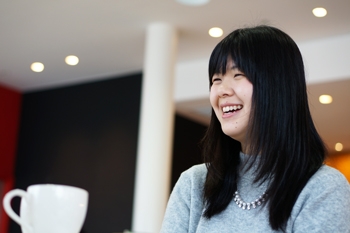
December 15, 2015
Report: Public Relations Group (F, i)
Photograph: Public Relations Group (i, G)
Location: “La Place” (Mermaid Café Hiroshima University)


 Home
Home





